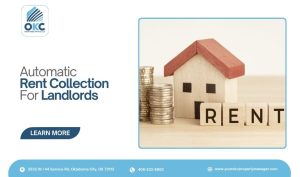You just received a message from a former tenant asking for a reference letter, and now you’re staring at a blank screen, wondering how to start. It’s one of those tasks that seems simple until you realize how much weight your words carry.
I’ve been managing properties in Oklahoma for over 20 years now, and I can’t tell you how many of these letters I’ve written. Learning how to write a landlord reference letter for a tenant was one of those skills nobody teaches you in property management. You just figure it out as you go.
Here’s what I’ve learned: A great reference letter isn’t just about saying “they paid rent on time.” It needs to be detailed, credible, and paint a complete picture of your tenant’s reliability. The landlords reading your letter are looking for the same things you look for when screening tenants; they want reassurance that this person won’t cause them headaches.
The good news? Once you understand the structure, writing a great reference letter takes no more than 15 minutes. And those 15 minutes can genuinely help a responsible tenant to secure their next home.
In this blog, I’ll show you exactly how to write a landlord reference letter that works. We’ll cover what details to include, what to avoid, and I’ll even share the template I personally use.
What Is a Landlord Reference Letter & When Is It Needed?
A landlord reference letter is an official written statement from a current or former landlord verifying a tenant’s rental history, payment behavior, and overall conduct during their lease term. This letter serves as a testament, screening, and background check for the new landlord to determine whether the tenant is reliable. According to the U.S. Department of Housing and Urban Development (HUD), landlords may share factual, non-discriminatory rental information to assist future housing providers in screening applicants fairly and lawfully under the Fair Housing Act (42 U.S.C. §§ 3604).
This letter is often required when a tenant applies for a new rental or seeks mortgage pre-approval where proof of reliable tenancy supports their application. Many property managers also use it to confirm stability for corporate leases or relocation programs. Your tenant might ask for a reference letter when they’re applying for a competitive rental in a hot market. Having a solid reference letter helps them beat out other applicants with similar credit scores and income levels.
It is also commonly needed when a tenant has limited rental history, is moving to a different state, or applying for upscale properties where landlords are extra selective. Some property management companies actually require reference letters as part of their standard application process.
In essence, a landlord reference letter acts as a character and reliability certificate within the rental industry. It builds trust between property owners, minimizes tenant screening risks, and supports compliance with fair housing and privacy laws.
How to Write a Standout Landlord Reference Letter for a Tenant?
Alright, let’s get into the actual writing process. I’ve refined my approach over the years, and honestly, it’s not complicated once you know what landlords are looking for.
1. Start with the basics: Open with your name, contact information, and how long the tenant rented from you. I always include the property address too; it adds credibility and shows you’re talking about a real tenancy, not just doing someone a favor.
2. Get specific and factual: This is where most landlords fall short. Don’t just say “they were great.” I always mention specific details: “Sarah paid rent on time for all 24 months of her tenancy” or “John reported maintenance issues promptly and allowed access for repairs without hassle.” These specifics matter way more than generic praise.
3. Address what other landlords care about: Always cover the big three: payment reliability, property condition, and whether they were good neighbors. Highlight these clearly to show your tenant’s trustworthiness, responsibility, and positive community presence.
4. Highlight their communication style: This is something I learned matters a lot. Mention whether the tenant responded quickly to texts, was easy to reach for inspections, or communicated issues before they became emergencies. Good communication is gold in the landlord-tenant relationship.
5. Include any extras that made them exceptional: Did they shovel snow for elderly neighbors? Help you coordinate with contractors? Pay a few days early consistently? These little details paint a picture of someone who goes above and beyond.
6. Keep it professional but personable. Use business letter format, but don’t sound like a robot. I write like I’m talking to a fellow landlord over coffee; professional, but human. Nobody wants to read a stiff, corporate-sounding letter.
7. End with a clear recommendation. Close with something like “I would happily rent to them again” or “I recommend them without reservation.” Then include your contact info and mention you’re available for follow-up questions. Landlords call you to verify details, and it always helps when they can reach you easily.
Landlord Reference Letter Template US (Example You Can Use)
Here’s a professional U.S.-based landlord reference letter template you can copy, adjust, and personalize. It follows best practices recommended by HUD and National Association of Residential Property Managers (NARPM) for factual and compliant communication.
[Your Name]
[Your Address]
[City, State, ZIP Code]
[Email Address]
[Phone Number]
[Date]
Dear [Recipient’s Name],
I am writing to provide a reference for [Tenant’s Full Name], who rented my property located at [Property Address, City, State, ZIP] from [Start Date] to [End Date]. During this [length of tenancy] period, [Tenant’s First Name] proved to be an exemplary tenant, and I am happy to recommend them as a reliable and responsible renter.
Throughout the entire tenancy, [Tenant’s First Name] consistently paid rent on time. [He/She/They] paid $[rent amount] monthly, and I never had to send late payment reminders or deal with bounced checks. One of the things I appreciated most was [Tenant’s First Name]’s communication style. [He/She/They] promptly reported maintenance issues, which allowed me to address problems before they escalated. [He/She/They] was always easy to reach and accommodating when I needed to schedule inspections or repairs.
[Tenant’s First Name] followed all lease terms and property rules without issue. [He/She/They] respected quiet hours and was considerate of the neighbors in the [building/neighborhood].
I recommend [Tenant’s First Name] without hesitation. [He/She/They] was one of the best tenants I’ve had in my [number] years of property management. Any landlord would be fortunate to have [Tenant’s First Name] as a resident.
Please feel free to contact me at [your phone number] or [your email] if you need any additional information or would like to discuss [Tenant’s First Name]’s tenancy further.
Sincerely,
[Your Signature]
[Your Name]
[Your Title]
What Should You Include in a Landlord Reference Letter?
A complete landlord reference letter should include verified, factual information that helps another landlord assess the tenant’s rental reliability. Let me break down exactly what needs to be in every reference letter you write. Miss any of these, and you’re leaving landlords with unanswered questions.
- Landlord and Property Details: Add your full name, business name, address, and contact information to validate authenticity.
- Tenant Identification: Include the tenant’s full name, rental property address, and lease term (start and end dates).
- Payment History: State whether rent was paid on time and note any late or missed payments.
- Property Condition: Mention how the tenant cared for the property, including cleanliness and maintenance.
- Lease Compliance: Reference adherence to lease rules, noise policies, and communication habits.
- Behavior and Communication: Indicate if the tenant was cooperative, responsive, and respectful toward neighbors or management.
- Recommendation Statement: Conclude with a clear, factual recommendation or neutral statement depending on the tenant’s record.
What Should You Avoid in a Landlord Reference Letter?
A landlord reference letter must remain factual, compliant, and free from personal bias. Here’s what NOT to do.
Don’t lie or exaggerate: Stick to facts you can back up. If a tenant was just “okay,” don’t oversell them as “excellent.” Other landlords may call to verify details, and inconsistencies damage your credibility as a reference.
Discriminatory or protected-class information: Never mention age, gender, marital status, national origin, religion, disability, or family composition. It’s illegal under Fair Housing laws and completely unnecessary. Focus purely on tenancy performance.
Skip the personal opinions about character. You’re commenting on their performance as a tenant, not their personal life. Don’t write about their political views, lifestyle choices, relationships, or personal struggles. Keep it strictly business.
Unverified claims or speculation: Do not assume reasons behind behavior. For example, don’t write, “They seemed stressed about finances.”
Avoid vague, generic statements. “They were a good tenant” tells nobody anything. These empty phrases make it sound like you barely knew the tenant or you’re hiding something.
Negative tone or accusations: If issues occurred, describe them factually, not emotionally: “Rent was late twice,” instead of “They were irresponsible.”
Mentioning ongoing legal or eviction issues: Discussing unresolved disputes or confidential matters can expose you to liability.
Can You Refuse to Provide a Letter of Recommendation?
Yes, as a landlord, you generally have the legal right to refuse to provide a letter of recommendation or reference for a tenant. There is no federal or state law that compels landlords to write reference letters, and it is usually at the landlord’s discretion whether or not to provide one.
That said, refusing to provide a reference should be handled carefully and professionally. It’s common for landlords to decline writing letters if they have had a negative experience with the tenant or if they prefer to give references only via direct inquiries from prospective landlords.
If you choose not to write one, communicate your decision professionally. A simple written statement such as “I’m not able to provide a reference letter at this time” or “I have a policy of only confirming dates of tenancy.”
If you’re uncomfortable writing a full recommendation but don’t want to leave them hanging, you can offer to provide a basic verification letter instead. This simply confirms the tenant lived at your property from X date to Y date and paid $Z monthly rent; no commentary on performance.
Get Professional Help on Landlord Documents or Property Management With Us
Writing landlord reference letters is just one of many documents you handle as a property owner. And while we’ve covered how to write effective letters that help good tenants and protect your credibility, the reality is that these tasks add up fast.
Reference letters, lease agreements, tenant screening, maintenance coordination, legal compliance; it all takes time away from what really matters to you. That’s where professional property management makes sense.
At OKC Home Realty, we handle all the landlord documentation and day-to-day management responsibilities so you don’t have to. We know Oklahoma rental laws, we’ve perfected tenant screening, and we maintain the professional relationships that keep your properties running smoothly.
Ready to make landlord life easier? Visit us at our physical address, 2532 W I-44 Service Rd, Oklahoma City, OK 73112, or give us a call at 405-232-5800.
Landlord Reference Letter FAQs
What should a landlord reference letter include?
A landlord reference letter should include the tenant’s name, property address, rental period, payment history, property condition, and lease compliance. It must remain factual, objective, and compliant with Fair Housing Act regulations.
Do landlords actually check references?
Yes, most landlords verify references to confirm rental history, payment reliability, and tenant behavior. It helps reduce risk and supports fair screening.
How to write a landlord letter of reference?
Use business letter format with your contact details. Be factual and clear, focus on payment reliability, property care, and tenant behavior without personal opinions or discrimination.
Is a landlord reference legally required?
No, you're not legally obligated to provide reference letters for any tenant. You can politely decline, especially for problematic tenants. Just avoid writing false or discriminatory information.
What to do if you don’t have a landlord reference?
Offer alternative references like employer letters, character references from professionals, bank statements showing financial stability, or consider offering a larger security deposit to offset landlord concerns.
How to ask for a landlord reference letter?
Contact your landlord 2-3 weeks in advance. Be specific about where you're applying and when you need it. Provide any details that make their job easier, and always follow up with thanks.
How important is a landlord reference?
It is very important in competitive markets. It acts as a trust signal during tenant screening, helping landlords evaluate reliability, communication, and lease compliance before approving an application.

Author
Scott Nachatilo is an investor, property manager and owner of OKC Home Realty Services – one of the best property management companies in Oklahoma City. His mission is to help landlords and real estate investors to manage their property in Oklahoma.
 (
(









